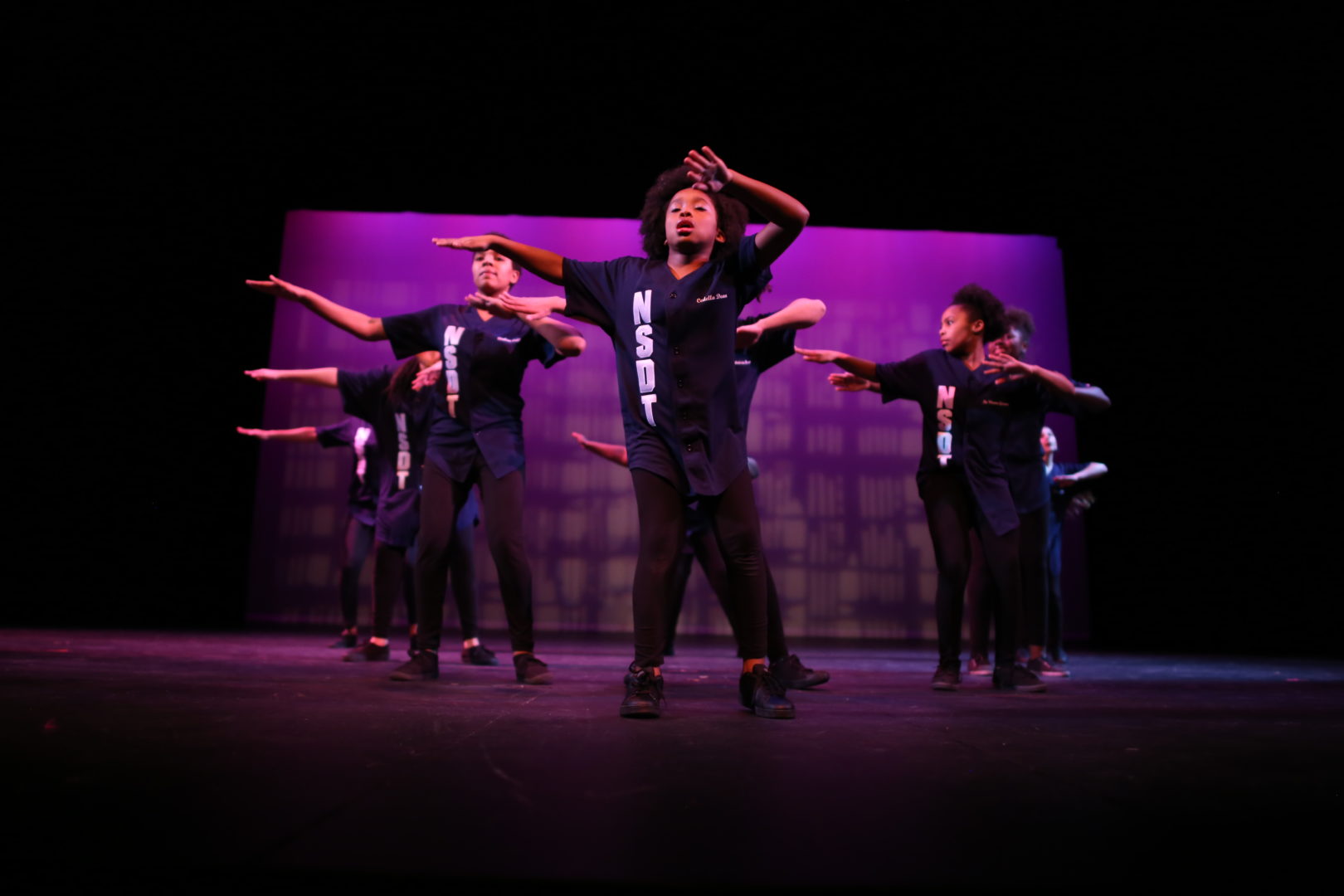Young girls on the Northside Step Team take center stage to speak up for gender and racial equality.
by Claire Butwinick
Photos by Brent James Driscoll
During a last-minute rehearsal to perfect their 10-minute routine, the high-pitched chants from the girls on the Northside Step Team echo outside the practice room and into the Shoreline, Wash. YMCA: “We are the ladies of Northside,” they repeat—their voices, claps and stomps ringing throughout the community center.
They’re getting ready for their next competition.
The girls on the Northside Step Team want to be heard and use their voices to speak up for gender and racial equity during performances. With the help of their coaches and choreographers, the girls write and recite spoken word and dance as a call for social justice.
During a recent routine, one Northside Stepper chanted, “We were born to stand out with action behind every word. Can’t no man deny me of opportunities destined for me. I will continue to be a queen, a warrior, a lover and a fighter.”
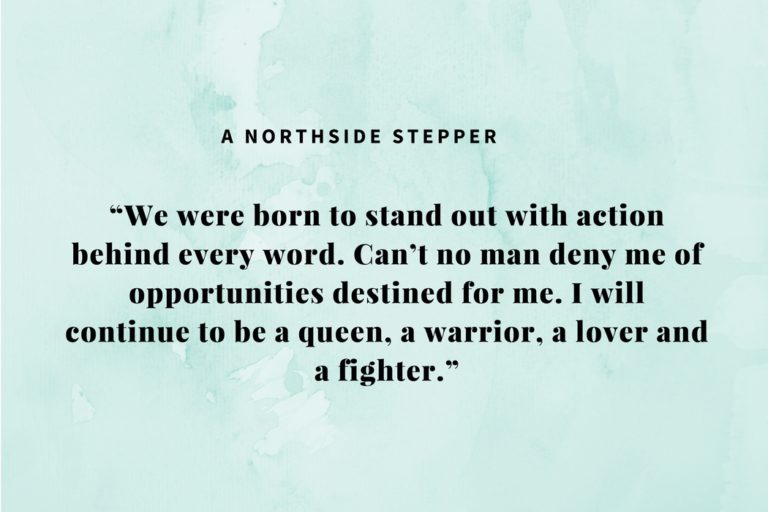
Step dancing, also known as drill, allows the girls to create messages by using their bodies and voices to make beats, dance, music and sounds. The movements, chants and sounds of step also share the history of black Americans.
Step originated with African tribal dances and was brought to the United States by African slaves. While working on plantations they would perform tribal dances to keep their culture alive and use call-and-response songs to exchange messages with one another. Call-and-response songs are still prevalent in step today, and now many incorporate spoken word as well. In World War II, black soldiers added military drill sequences to step, which the girls on the Northside Step Team emulate with sharp arm movements and coordinated stomping in their routines. Elements of hip-hop and Motown have also been added to step routines to capture a more modern black culture.
In the early 1900s black sororities and fraternities were established in the United States and were nicknamed the Divine Nine. In the 1960s, these Greek organizations began embracing step dancing and developed community around a shared cultural tradition. Today, many of the original Divine Nine sororities including Kappa Alpha Kappa and Delta Sigma Theta compete and perform step on a national scale.
Step has also been popularized by the 2017 documentary, “STEP,” which follows members of a girls step team in Baltimore. The film demonstrates how step motivates them to succeed in school and find their own voices as young black women.
The Northside Step Team program director, Darnesha Weary, says that the performances and values taught in the group inspire the girls’ self-confidence to become stronger.
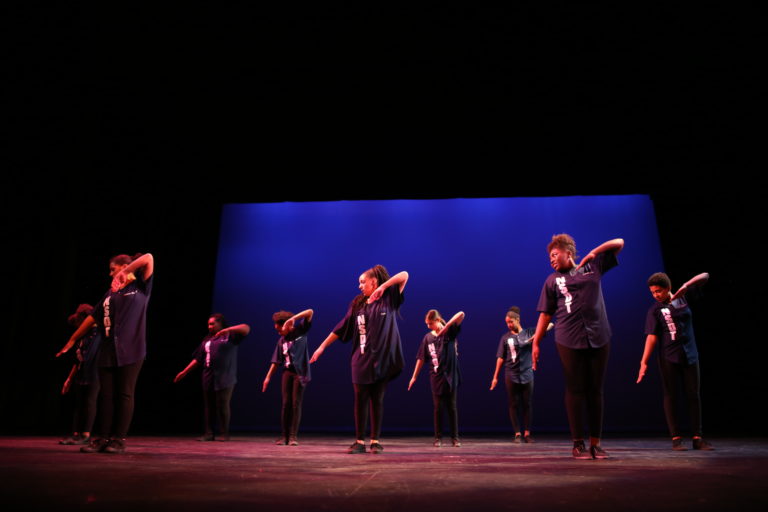
“They love the bodies they’re in, the skin they’re in, what their hair looks like,” says Weary. “They are beautiful and they are proud, and this is how we can express that.”
Last year, the team performed a Black Lives Matter (BLM) inspired routine for a competition in Oakland, Calif. The routine included African music and chant and ended with each girl holding a protest sign. Some signs read “My Life Matters” and others said “I Will Not Be Silent.”
Sixteen-year old Kayla Bitzer is the captain of the Northside Step Team. She says the BLM routine was the highlight of being on the drill team.
“We made these posters that had all these sayings on them,” says Bitzer. “We held them up at the end of our stepping, and it was just a real powerful moment.” The performance brought the audience to tears and won them first place in the competition. The team returned to Oakland this past March to defend their title.
For their returning performance in Oakland, the girls created a fantasy-inspired routine where they were frozen in place throughout the show, and they used the power of step to thaw themselves free. The older girls were decked out with sparkly masks, and the younger girls wore matching dresses for the occasion.
For the past 18 years, Weary has taught girls from ages four to 18 from all backgrounds in King County how to step, be themselves and speak their minds. Weary began integrating serious conversations into the program when she realized that the girls on the step team needed an outlet to talk about social issues that impacted their lives. Today, the Northside steppers talk openly about police brutality, racial division and gender inequality during practice, and those conversations inspire their routines.
“I tell them, ‘I never want to shush you,’” says Weary. “I think that’s the worst thing we can do to our youth is to teach them to be quiet.”
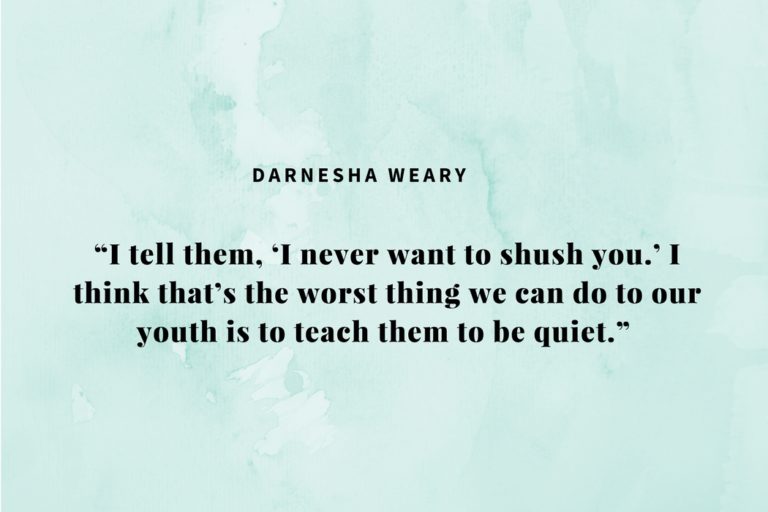
When Weary was growing up, step wasn’t just an activity, it was a family tradition. Her grandfather had his own step group in Seattle, and her mother performed on his team. Weary’s mother introduced her to step as a young girl. She immediately fell in love with performing and felt a sense of belonging. In college, Weary joined Zeta Phi Beta, one of the nine black Greek organizations, and stepped with her sorority sisters.
As an adult, Weary wanted to give back to her community and share her passion for step, so she continued her family’s legacy and started her own team. She recalls that stepping taught her discipline, communication and community, and she wanted to instill those values for other girls in Seattle. And in a city that is less than six percent African American, the Northside Step Team was an opportunity for young black girls to find community and embrace their heritage.
“It’s not very popular up in this area. It’s very popular in the south. Most schools, community groups, churches have step groups, but not in Seattle,” says Weary.
Weary started the Northside Step Team in 2000 with only three members. Step was not popular in the Pacific Northwest, but Weary encouraged parents to bring their kids to practice to introduce them to the art form. The team has quadrupled in size, and Weary’s own daughter steps and helps choreograph the Northside Step routines.
Weary says that performing on the drill team shows the girls that they have a voice and gives them confidence that drives them to become the next generation of leaders.
Dawn Hamid is the mother a longtime Northside stepper. Her teenage daughter has grown up dancing and has gained leadership skills and poise in front of audiences from drill. As Hamid’s daughter enters high school, she uses the voice she developed from stepping to address social issues.
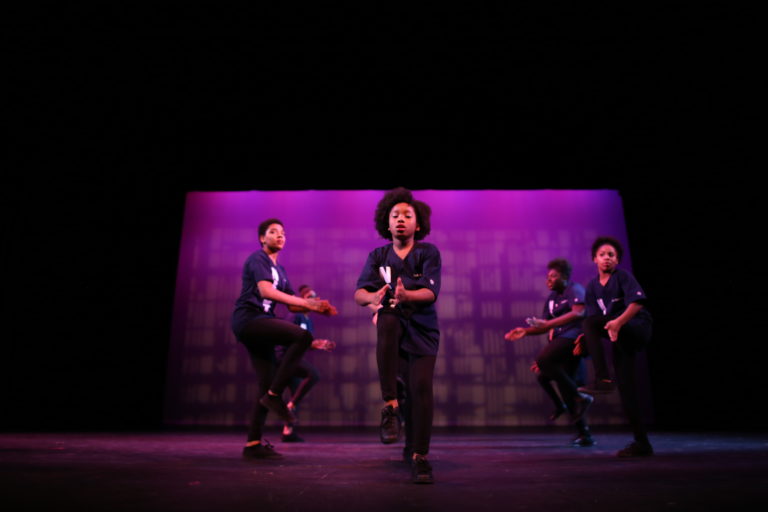
“She’s interested in politics. She’s interested in, ‘Why does this happen? Why is this black and white?’” says Hamid. “I think being on the drill team has really helped open up the portal for her—for all of [the team] actually.”
Northside coach Denise Madden says that the weekend before their competition in Oakland, the girls all got their hair braided by a previous Northside stepper and one of the coaches.
“One of the older girls came and braided hair for an entire day,” says Madden. “It’s an ordeal—about four or five hours per head. They really come together today.”
Madden says that when the girls are not stepping, they are having sleepovers or going out to eat together just like sisters. And like a family, many members of the step team still participate with Northside by coming back to coach or signing their own daughters up to step with the team. Weary hopes for the Northside family to grow and to continue to be a place for girls to be themselves and speak their minds.
“We’re gonna accept everyone who comes through that door that wants to be a part of our group,” she says.

Claire Butwinick is a contributing writer for The Riveter magazine and a journalism student at the University of Washington in Seattle. When she isn’t conducting interviews for stories about women’s issues, you will find her contemplating the perfect Instagram caption. Check out her Instagram and Twitter at @clairebutwinick.

